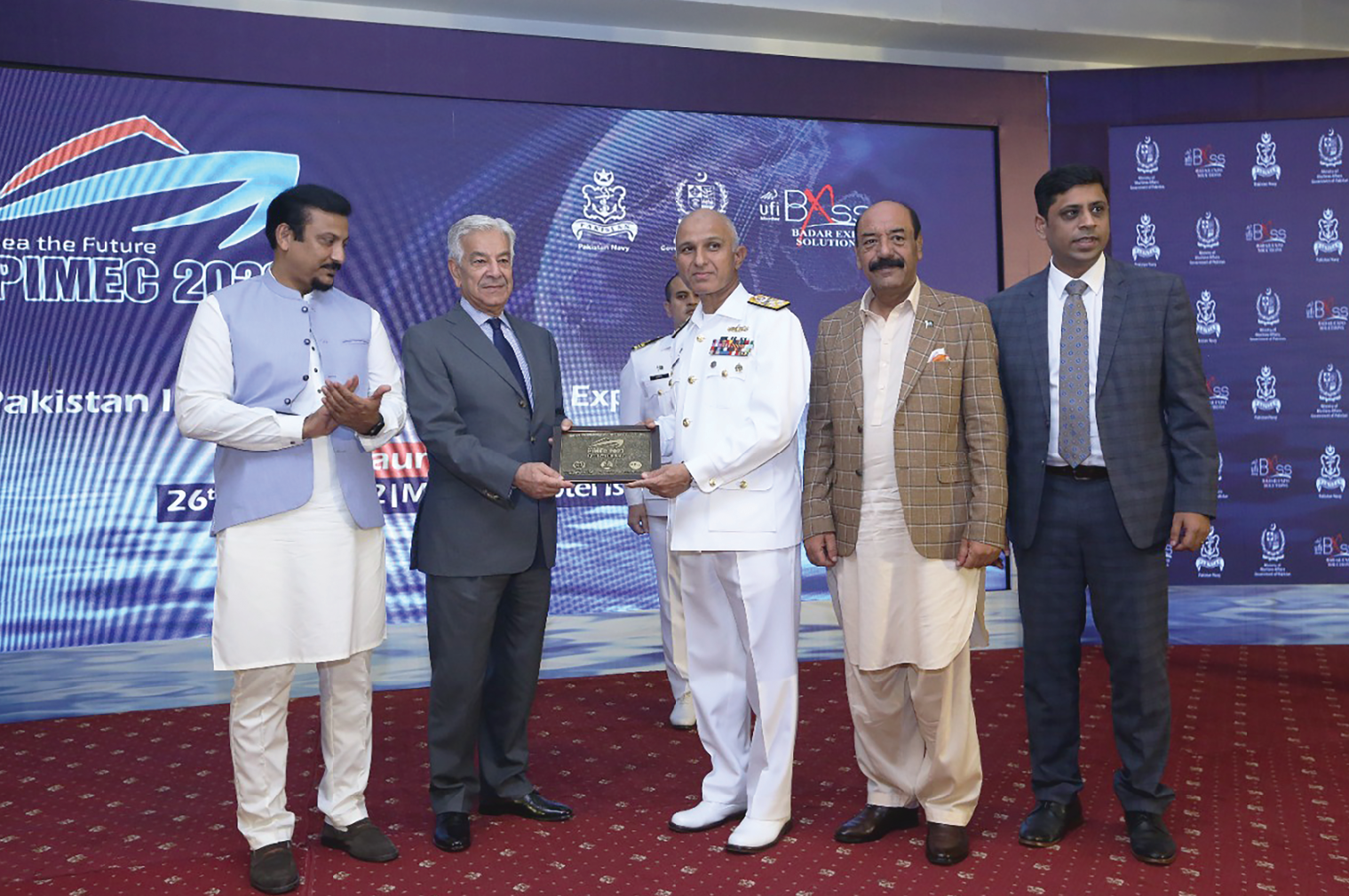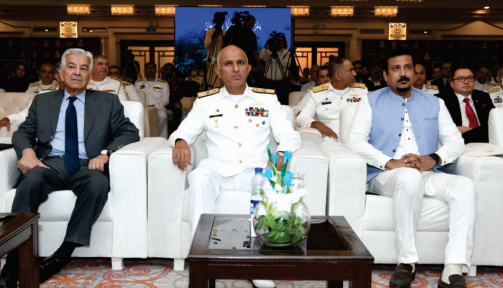
The event is aimed at promoting harmony and linkages between industries, consumers, businesses, and academia at the national and international levels, besides pivoting on strategizing diplomacies in technology and progression.
Dr. Maliha Zeba Khan
Exhibitions, exercises, training, conferences, symposia, and field tours are efficient tools of diplomacy. States do use these tools commonly to extend persuasive and cooperative diplomacy, and the outcome is pretty effective enhancing intra-regional and inter-regional relations at all levels.
Adding spatiotemporal dimension augments efficacy, and synthesizing and strategizing such activities can culminate in supplemented dividends. The maritime-related event of the Pakistan International Maritime Expo and Conference (PIMEC) is one such event, which is going to be held on 10-12 February 2023 in Karachi.

PIMEC 2023 is aimed at promoting harmony and linkages between industries, consumers, businesses, and academia at the national and international levels. The concept of PIMEC 2023 is pivoting on strategizing diplomacies in harmony with technology and progression.
Technology is a word that resonates well with the development and progression of the states. But this is not the end. Rather every technological advancement has opened new vistas. Particularly, interstate and inter-regional relations have gone through undeniable shifts with every new technology making it a cornerstone of emerging political and academic developments at the international level.
The industrial revolution changed the power quotient of the world giving way to new superpowers. The two World Wars, Cold War, and then the post-Cold War era, all were marred with newer technologies that changed world politics on one hand and initiated novel topics and areas into the academic realm on other hand.
The same has been done with developments linked with oceanic spaces. The journey which started with logs sailing in waters, and people trying to traverse through larger bodies of water has now entered the phase of motherships, complex vessels, rigging and exploration platforms, and aircraft careers where every single day is bringing afore new machines, digitization and digitalization of previous technologies. That has given numerous opportunities to states and non-state actors to reconfigure their policy choices and to enter into newer kinds of diplomacy and ventures involving newer technologies of traditional and non-traditional avenues.
Nonetheless, oceans cover 70 percent of the earth; however, 30 percent of the land part makes up a mindset that is dominant and reflects a certain type of sea blindness. This oblivion toward seas has taken its toll on the growth and development of nation-states. Sea blindness has affected spatiotemporal foreign relations which could bring immense monetary and non-monetary dividends to littoral states.
Oceans host economic opportunities with the potential to maximize employment resulting in inter-connected policies and a sustainable economy. The vast array of maritime and coast-related economic activities, now known as Blue Economy, range from shipping, fishing and seafood, hydrocarbons, several other minerals and gases, energy, tourism, and communication to geo-politico-commercial activities which essentially require reconfiguration of foreign policies to maximize stakes as well as gains. Interestingly, all such economic activities have a strong impact on societies in terms of growth and development and the underlying factor is the advancement of technology and the introduction of further mechanization to processes.
Pakistan is a coastal state situated at very significant coordinates in terms of proximity with energy-rich Middle East and Central and Northern Asia, physical presence points of great powers in the region, and key regional actors. It has emerged as the focal point of the contemporary era’s geopolitics and geo-economics indicating unique approaches to economic connectivity (g2g and b2b) and social connections (p2p). It is Pakistan’s location that enables it to become a rimland connection toward the hinterlands of Afghanistan, China, and Central Asian Republics. The juxtaposing of the Maritime Silk Road (MSR) with China Pakistan Economic Corridor (CPEC) at Gwadar port has added another dimension to the Blue Economy of Pakistan.
Maritime technologies have not only advanced the modes of transportation for trade and commerce, movement of passengers, recreation, and search and rescue activities; but it has increased opportunities for cooperation and collaboration. It involves widened kinetic and non-kinetic diplomatic activities like economic diplomacy, commercial diplomacy, science and technological diplomacy, digital diplomacy, education diplomacy, cultural diplomacy, and naval diplomacy. Besides the widening of diplomacy and foreign policies, maritime technologies have deepened the understanding of political moves, economic maneuvering, and naval wisdom making it more ‘smart’.
Since seas and oceanic spaces are believed to be shared responsibility and common heritage, there is the likelihood of cooperation and collaboration on which Pakistan has structured its idea of PIMEC 2023. Though not novel as states use the means of exhibitions for displaying their capabilities and to market them in the world, Pakistan has launched the concept of PIMEC with massive potential for connectivity, investment opportunities, learning from each other’s experiences, and academic knowledge sharing. The spectrum of products, systems, and services, participants and stakeholders coming from different backgrounds, and opportunities like ship/ crew building, renewable energy, offshore oil drilling, marine biotechnology, desalination, and fisheries will be important features of the event. Other major avenues which could be explored are maritime logistics, technology transfers, defense manufacturers, ship repair, ship breaking, maritime training, tourism, environmental protection, and real estate business along the coast.
All products, services, and systems under one roof as PIMEC 2023 is a complacent idea that is being made possible by Pakistan which is being led by the Pakistan Navy with cooperation from the Ministry of Maritime Affairs, Badar Expo Solutions, and other agencies and departments. Besides G2G, B2B, and P2P opportunities of interaction and joint ventures, one very significant outcome would be confidence building, soft image building of Pakistan, and positivity toward regionalism and global efforts to attain SDGs and to get rid of socioeconomic disparities, hunger, and poverty, environmental protection and marine biodiversity. Another significant feature is the International Maritime Conference which is going to be organized by the National Institute of Maritime Affairs (NIMA) during PIMEC 2023. This academic and scholarly event will provide an opportunity to interact at the level of academia and industry to enhance their linkages and boost collaborative focused research to deal with emergent challenges related to the maritime industry and environment.
The well-coordinated effort in the form of PIMEC 2023 by the Pakistan Navy and Ministry of Maritime Affairs besides other organizations, agencies, and departments is a distinct event, which will play a remarkable role in extending effective yet unique diplomacy involving changing trends and technological advancements at the global level. That is going to bring a change in the continental mindset and will play a role in bringing a shift from sea blindness to sea awareness.

The writer is working as Assistant Professor at the Department of IR, NUML, Islamabad.

